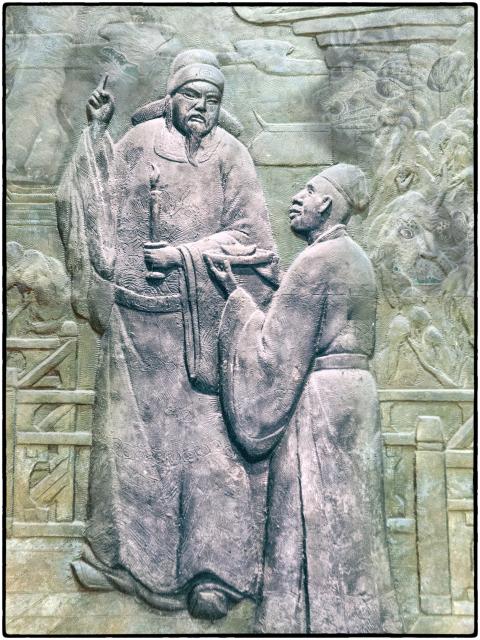Chinese practice
三人成虎
with three people, the tiger becomes real

Photo: Paul Cooper, Taipei Times
照片:台北時報記者古德謙攝
(san1 ren2 cheng2 hu3)
這個成語源自《戰國策.魏策二》。魏國和趙國都是東周戰國時期的大國,魏國的太子被送到趙國作為人質,以確保兩國的和平。魏國大臣龐蔥將要陪同太子到趙國去,而他不知何時才能回國。他勸魏王別相信那些趁他不在國內時所流傳的惡意謠言。
龐蔥問魏王:「如果現在有一個人來說,市街上有隻老虎,請問您會相信嗎?」魏王答:「不相信。」龐蔥再問:「那麼如果有兩個人說,市街上有隻老虎,請問您會相信嗎?」魏王答道:「我會開始懷疑這是真的。」龐蔥繼續問,若是有三個人這樣說呢?魏王承認說這樣他就會相信了。
這個故事便是「三人成虎」這成語的由來,它字面上的意思是說若有好幾個人說有老虎,那麼這就變成像真理一樣可信了。
這故事的發展是,後來龐蔥如期啟程了,且在他出國期間謠言也的確在國內流傳,而魏王也的確開始聽信謠言,到了龐蔥回國後,魏王與龐蔥之間便出現了嫌隙。
這故事現今聽來格外貼切,如今有許多人說我們已進入「後事實」階段,無所不在的電腦網路促使人們不再重視事實。事實上(或我這麼認為),這情況自古皆然。無論其意圖和目的為何,若有夠多的人這樣說,那麼它就變成真的了。你只要把謊言重述夠多次—通常越荒謬虛假越好—人們就會信以為真。
(台北時報編譯林俐凱譯)
■ 雖然沒做虧心事,還是低調一點好,要是有人忌妒造謠,三人成虎,會讓你跳到黃河也洗不清。
(Even if you do nothing wrong, it’s best to keep a low profile. People can be jealous and spread rumors, and once it’s out there it’s difficult to prove otherwise.)
英文練習
if you repeat a lie often enough it becomes the truth
This idiom originally comes from the second part of the Strategies of Wei in the ancient Chinese text the Strategies of the Warring States, or Zhan Guo Ce.
Wei was one of the major states during the Warring States, a period of political upheaval and weak central government, as was the state of Zhao. When the exchange below occurs, the “king” of Wei’s son is to be sent to Zhao to act as hostage guarantor for a treaty between the two states. Pang Cong, a senior Wei official, is to accompany the prince on his journey. He has no idea when he will return. He approaches the king, and asks him not to believe malicious rumors about him in his absence.
Pang Cong says to the king, “If today somebody says there is a tiger loose in the city streets, would you believe him?” The king answers “no, I would not.” Pang presses with, “And if two people say there is a tiger loose in the city streets, would you believe them?” The king replies, “I would start to suspect it to be true.” Pang then asks what the king would think if three people said a tiger were loose in the streets. The king admitted that he would have to believe it.
From this story comes the idiom 三人成虎, meaning that if several people say there is a tiger, then it becomes believable as truth.
For those interested, Pang did leave, rumors did abound in his absence, the king did start to believe them, and their relationship faltered on Pang’s return.
This saying is particularly pertinent these days, when so many people are talking about our entering a “post-truth” phase, aided and abetted by the ubiquity of the Internet. In fact, this has been true since ancient times (or so I say). If enough people say something, it becomes — to all intents and purposes — true. All you need do is repeat a lie enough times — and often the more absurd and falsifiable the lie, the better — then people will start to believe it. (Paul Cooper, Taipei Times)
■ Rumors spread like wildfire on the Internet, and when they do, they get repeated by many people. In the end nobody is sure what to believe.
(網路上謠言流傳得極快,經不斷轉寄散佈,三人成虎,常令人弄不清真假。)

Thailand and Cambodia are engaged in their worst fighting in over a decade, exchanging heavy artillery fire across their disputed border, with at least 30 people killed and tens of thousands displaced. Tensions began rising between the Southeast Asian neighbors in May, following the killing of a Cambodian soldier during a brief exchange of gunfire, and have steadily escalated since, triggering diplomatic spats and now, armed clashes. WHERE DOES THE DISPUTE ORIGINATE? Thailand and Cambodia have for more than a century contested sovereignty at various undemarcated points along their 817km land border, which was first mapped by France in 1907 when Cambodia was

Alan Turing, celebrated as the “father of computer science,” was a brilliant mathematician and scientist. Born in London in 1912, Turing showed exceptional talent in mathematics and science from a young age. At 16, he understood Albert Einstein’s work without difficulty. This intelligence carried him through studies at Cambridge University and later at Princeton University in the US, where he further explored complex mathematical theories. In 1936, Turing introduced the concept of the Turing machine, a theoretical device for solving mathematical problems. He described it as having an infinite tape on which symbols could be read, interpreted, and modified. With simple

A: After touring Taipei, the play Life of Pi is now heading to Taichung. You wanna go? B: Did you forget? We’re going to Taipei this weekend to see the musical Sunset Boulevard and go to Japanese pop diva Ayumi Hamasaki’s concert. A: Oh yeah, that’s right. The classic composed by Andrew Lloyd Webber is touring Taiwan for the first time. B: I heard that it’s adapted from a 1950 film with the same title. A: And the show will feature legendary soprano Sarah Brightman, who is finally returning to the musical stage after 30 years. We can’t miss it. A: 在台北巡演後,戲劇《少年Pi的奇幻漂流》本週起將移師台中。要去嗎?

A: Apart from the musical Sunset Boulevard, Japanese pop diva Ayumi Hamasaki is also touring Taiwan after a 17-year wait. She’s holding two concerts starting tonight. B: Ayu has the most No. 1 hits of any Japanese solo artist, with 33 total. A: “Time” magazine even crowned her as “The Empress of Pop.” B: She staged shows in Taipei back in 2007 and 2008, causing an “Ayu fever” across Taiwan. A: Unfortunately, the singer has been deaf in her left ear since 2008, and is gradually losing hearing in her right ear. I’m so excited to see her singing in Taipei again. A: 除了音樂劇《日落大道》,日本歌后濱崎步睽違17年,今晚起在台北熱唱兩場。